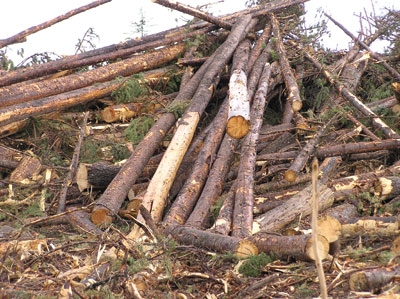
$2.7M in funding announced for four BC biomass projects
January 31, 2020
By Forest Enhancement Society of BC

The Forest Enhancement Society of BC (FESBC) has allocated another $2,737,764 in grants for four projects that will support forestry contractors and increase the use of wood fibre that otherwise would have been burned.
Doug Donaldson, Minister of Forests, Lands, Natural Resource Operations and Rural Development, made the announcement at the Western Forestry Contractors’ Association conference in Prince George on Jan. 30, 2020.
“Our government’s focus is creating jobs in the forest sector by getting the most out of the fibre that comes out of our public forests,” said Donaldson. “Our partnership with the Forest Enhancement Society of BC is making sure that more fibre gets turned into viable products – supporting good jobs in rural B.C. – and less is left on the forest floor.”
These projects will turn wood waste from slash piles into wood pellets and pulp products, and they will help achieve B.C.’s and Canada’s climate change targets. The grants are being allocated as follows:
- $408,320 to Skeena Bioenergy Ltd. to use material from slash piles to make wood pellets (about 22,000 cubic metres or 440 truckloads) in the Coast Mountains Natural Resource District.
- $1,080,000 to Taan Forest Products to use material from slash piles to make pulp for use in paper products (about 51,000 cubic metres or 1,020 truckloads) in the Haida Gwaii Natural Resource District.
- $880,000 to Skookumchuck Pulp Inc. to use material from slash piles to make pulp for use in paper products (about 110,000 cubic metres or 2,200 truckloads) in the Rocky Mountain Natural Resource District.
- $369,450 to RPP Holdings Inc. to use material from slash piles to make pulp for use in paper products (about 36,000 cubic metres or 720 truckloads) in the Quesnel Natural Resource District.
As of Jan. 30, 2020, the Forest Enhancement Society of BC has supported 250 projects valued at $233 million, in partnership with the B.C. government and the Government of Canada.
“As I’ve travelled around the province, I’ve seen first-hand how these grants from the Forest Enhancement Society of BC are making a difference in our communities,” said Ravi Kahlon, Parliamentary Secretary for Forests, Lands, Natural Resource Operations and Rural Development. “It’s encouraging to see wood debris diverted from slash piles and used to make value-added products instead.”
Projects funded by the Forest Enhancement Society of BC help minimize wildfire risks, enhance wildlife habitat, improve low-value and damaged forests, re-plant damaged forests and utilize fibre for green energy production. Many of these projects also result in carbon benefits and contribute to climate change mitigation.
“Assisting the province to reduce greenhouse gases, add value to forest fibre and maintain jobs for workers and communities are some of our key objectives,” said Wayne Clogg, board chair, Forest Enhancement Society of BC. “There are many society-funded projects throughout B.C. that are making a difference right now. The amount of biomass (woody debris) that will not be burned as slash – but instead used this winter season to fuel a greener economy – is expected to exceed 1.6 million cubic metres by March 2020. Funding has been committed to continue some of these projects to 2022 to further help forest workers and communities who are most in need.”
Print this page